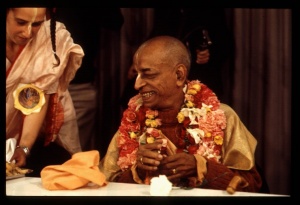SB 5.23.8: Difference between revisions
m (1 revision(s)) |
(Vanibot #0018 edit: make synonym terms in Sanskrit italic in SB - Vanisource) |
||
| Line 1: | Line 1: | ||
{{info | {{info | ||
|speaker= | |speaker=Śukadeva Gosvāmī | ||
|listener=King | |listener=King Parīkṣit | ||
}} | }} | ||
[[Category:Srimad-Bhagavatam - Canto 05 Chapter 23]] | |||
[[Category:Bhagavatam Verses Spoken by Sukadeva Gosvami - Vanisource|052308]] | |||
<div style="float:left">'''[[Srimad-Bhagavatam]] - [[SB 5|Fifth Canto]] - [[SB 5.23: The Sisumara Planetary Systems|Chapter 23: The Śiśumāra Planetary Systems]]'''</div> | |||
<div style="float:right">[[File:Go-previous.png|link=SB 5.23.7]] '''[[SB 5.23.7]] - [[SB 5.23.9]]''' [[File:Go-next.png|link=SB 5.23.9]]</div> | |||
{{RandomImage}} | |||
==== TEXT 8 ==== | ==== TEXT 8 ==== | ||
<div | <div class="verse"> | ||
etad u haiva bhagavato viṣṇoḥ sarva-devatāmayaṁ rūpam aharahaḥ sandhyāyāṁ prayato vāgyato nirīkṣamāṇa upatiṣṭheta namo jyotir-lokāya kālāyanāyānimiṣāṁ pataye mahā-puruṣāyābhidhīmahīti | :etad u haiva bhagavato viṣṇoḥ sarva-devatāmayaṁ rūpam | ||
:aharahaḥ sandhyāyāṁ prayato vāgyato nirīkṣamāṇa | |||
:upatiṣṭheta namo jyotir-lokāya kālāyanāyānimiṣāṁ | |||
:pataye mahā-puruṣāyābhidhīmahīti | |||
</div> | </div> | ||
| Line 13: | Line 22: | ||
==== SYNONYMS ==== | ==== SYNONYMS ==== | ||
<div | <div class="synonyms"> | ||
''etat''—this; ''u ha''—indeed; ''eva''—certainly; ''bhagavataḥ''—of the Supreme Personality of Godhead; ''viṣṇoḥ''—of Lord Viṣṇu; ''sarva-devatā-mayam''—consisting of all the demigods; ''rūpam''—form; ''ahaḥ-ahaḥ''—always; ''sandhyāyām''—in the morning, noon and evening; ''prayataḥ''—meditating upon; ''vāgyataḥ''—controlling the words; ''nirīkṣamāṇaḥ''—observing; ''upatiṣṭheta''—one should worship; ''namaḥ''—respectful obeisances; ''jyotiḥ-lokāya''—unto the resting place of all the planetary systems; ''kālāyanāya''—in the form of supreme time; ''animiṣām''—of the demigods; ''pataye''—unto the master; ''mahā-puruṣāya''—unto the Supreme person; ''abhidhīmahi''—let us meditate; ''iti''—thus. | |||
</div> | </div> | ||
| Line 20: | Line 29: | ||
==== TRANSLATION ==== | ==== TRANSLATION ==== | ||
<div | <div class="translation"> | ||
My dear King, the body of the śiśumāra, as thus described, should be considered the external form of Lord Viṣṇu, the Supreme Personality of Godhead. Morning, noon and evening, one should silently observe the form of the Lord as the Śiśumāra-cakra and worship Him with this mantra: "O Lord who has assumed the form of time! O resting place of all the planets moving in different orbits! O master of all demigods, O Supreme Person, I offer my respectful obeisances unto You and meditate upon You." | My dear King, the body of the śiśumāra, as thus described, should be considered the external form of Lord Viṣṇu, the Supreme Personality of Godhead. Morning, noon and evening, one should silently observe the form of the Lord as the Śiśumāra-cakra and worship Him with this mantra: "O Lord who has assumed the form of time! O resting place of all the planets moving in different orbits! O master of all demigods, O Supreme Person, I offer my respectful obeisances unto You and meditate upon You." | ||
</div> | </div> | ||
__NOTOC__ | |||
<div style="float:right; clear:both;">[[File:Go-previous.png|link=SB 5.23.7]] '''[[SB 5.23.7]] - [[SB 5.23.9]]''' [[File:Go-next.png|link=SB 5.23.9]]</div> | |||
__NOTOC__ | |||
__NOEDITSECTION__ | |||
Revision as of 01:54, 1 December 2017

A.C. Bhaktivedanta Swami Prabhupada
TEXT 8
- etad u haiva bhagavato viṣṇoḥ sarva-devatāmayaṁ rūpam
- aharahaḥ sandhyāyāṁ prayato vāgyato nirīkṣamāṇa
- upatiṣṭheta namo jyotir-lokāya kālāyanāyānimiṣāṁ
- pataye mahā-puruṣāyābhidhīmahīti
SYNONYMS
etat—this; u ha—indeed; eva—certainly; bhagavataḥ—of the Supreme Personality of Godhead; viṣṇoḥ—of Lord Viṣṇu; sarva-devatā-mayam—consisting of all the demigods; rūpam—form; ahaḥ-ahaḥ—always; sandhyāyām—in the morning, noon and evening; prayataḥ—meditating upon; vāgyataḥ—controlling the words; nirīkṣamāṇaḥ—observing; upatiṣṭheta—one should worship; namaḥ—respectful obeisances; jyotiḥ-lokāya—unto the resting place of all the planetary systems; kālāyanāya—in the form of supreme time; animiṣām—of the demigods; pataye—unto the master; mahā-puruṣāya—unto the Supreme person; abhidhīmahi—let us meditate; iti—thus.
TRANSLATION
My dear King, the body of the śiśumāra, as thus described, should be considered the external form of Lord Viṣṇu, the Supreme Personality of Godhead. Morning, noon and evening, one should silently observe the form of the Lord as the Śiśumāra-cakra and worship Him with this mantra: "O Lord who has assumed the form of time! O resting place of all the planets moving in different orbits! O master of all demigods, O Supreme Person, I offer my respectful obeisances unto You and meditate upon You."